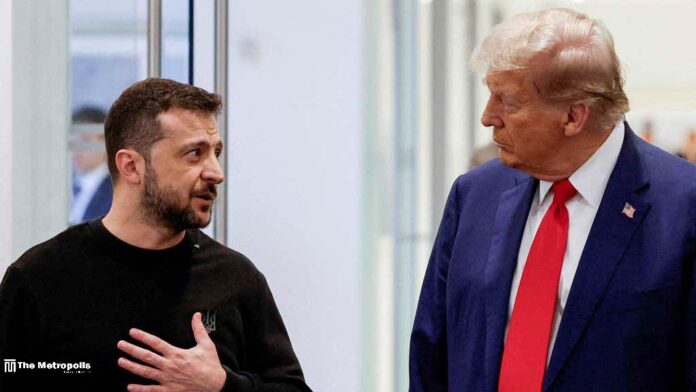During an interview with Reuters on Friday, Ukrainian President Volodymyr Zelensky reviewed a previously classified map detailing vast reserves of rare earth elements and other critical minerals. This move is seen as an effort to appeal to former U.S. President Donald Trump’s well-known deal-making approach.
The current U.S. president, whose administration has been advocating for a swift resolution to Ukraine’s ongoing war with Russia, stated on Monday that he expects Ukraine to supply rare earth minerals to the U.S. in exchange for financial support in its defense efforts.
“If we are talking about a deal, then let’s do a deal, we are fully open to it,” Zelensky stated, underscoring the importance of securing guarantees from Ukraine’s allies as a condition for any agreement.
Ukraine initially proposed allowing allied nations to invest in its critical minerals sector last autumn, incorporating the initiative into a broader “victory plan” designed to strengthen its negotiating position and pressure Moscow to engage in peace talks.
Zelensky noted that less than 20% of Ukraine’s mineral reserves, including nearly half of its rare earth deposits, remain under Russian occupation.
Rare earth elements are essential components in high-performance magnets, electric motors, and consumer electronics. Zelensky warned that Russia could grant access to these resources to its allies, such as North Korea and Iran—both considered adversaries of the U.S.
“We must stop Putin and protect what we possess—our resource-rich Dnipro region and central Ukraine,” he stressed.
For months, Russian forces have been advancing in eastern Ukraine, launching sustained assaults and deploying significant resources. Meanwhile, Ukraine’s smaller army faces troop shortages and concerns over the continued supply of weapons from foreign allies.
During the interview, Zelensky displayed a detailed map in his fortified office in Kyiv, illustrating the country’s mineral wealth. The map highlighted a significant mineral-rich region in the east, with nearly half of the deposits currently under Russian control.
Ukraine holds the largest titanium reserves in Europe—critical for the aviation and space industries—as well as uranium, essential for nuclear energy and weaponry. Many titanium deposits are located in northwestern Ukraine, far from active combat zones.
Adapting to the transactional approach of the new U.S. administration, Kyiv has recalibrated its foreign policy to align with Washington’s priorities.
However, Zelensky emphasized that Ukraine is not offering to “give away” its resources but instead proposing a mutually beneficial partnership:
“The Americans have provided the most support, so they should receive the most benefits. They will have priority access. I look forward to discussing this directly with President Trump,” he said.
Zelensky pointed out that Russia has detailed knowledge of Ukraine’s mineral reserves due to Soviet-era geological surveys that were transferred to Moscow following Ukraine’s independence in 1991.
Additionally, discussions between Kyiv and Washington have included the potential for Ukraine’s vast underground gas storage facilities to be used for storing U.S. liquefied natural gas (LNG).
“I know the Trump administration is very interested in this… We are ready and willing to sign contracts for LNG supplies to Ukraine. We also aim to serve as a strategic hub for Europe,” he stated.
Zelensky Pushes for Trump Meeting Before U.S.-Russia Talks
The interview comes just ahead of the Munich Security Conference, scheduled for February 14-16, where officials from multiple Western nations will gather at a critical moment in Ukraine’s nearly three-year war.
Zelensky confirmed his attendance at the conference, where Keith Kellogg, Trump’s special envoy for Russia and Ukraine, is also expected to participate. The Ukrainian president stressed the importance of meeting with Trump before any potential U.S.-Russia discussions, warning that otherwise, “it would appear as though Ukraine is being discussed without Ukraine at the table.”
On Friday, Trump indicated that he expects to speak with Zelensky next week. The Ukrainian leader said his main focus in those talks would be securing long-term security guarantees to prevent future Russian aggression.
He also highlighted the need for a unified Western strategy before engaging in negotiations with Moscow.
Regular communication is already taking place between Zelensky’s team and key figures in Trump’s administration, including Kellogg and National Security Adviser Michael Waltz.
“We are in daily contact, discussing general topics, but the specifics will come later,” Zelensky said.
Trump’s push for a peace agreement comes as Russian forces continue to advance, posing a threat to Ukraine’s major logistics hub in Pokrovsk.
On the battlefield, Zelensky confirmed for the first time that Ukrainian troops launched a new offensive on Thursday, advancing 2.5 kilometers (1.5 miles) into Russia’s Kursk region.
Russia had previously reported a Ukrainian attack in the area that day, claiming it was repelled.
Zelensky also noted that thousands of North Korean troops fighting alongside Russian forces had recently resumed combat operations against Ukraine’s military in the Kursk region after a brief pause.
Next week, Ukraine’s government plans to introduce lucrative recruitment contracts to encourage young men aged 18-24—below the official draft age—to voluntarily enlist in the armed forces to help address the manpower shortage. However, Zelensky declined to disclose the expected number of recruits.



